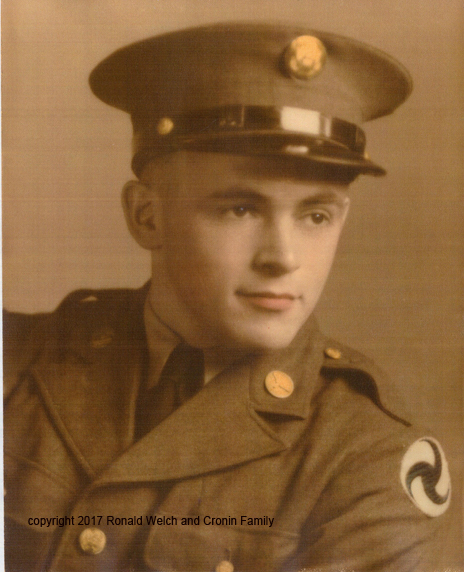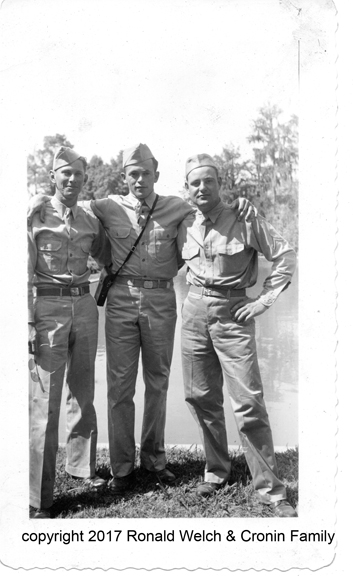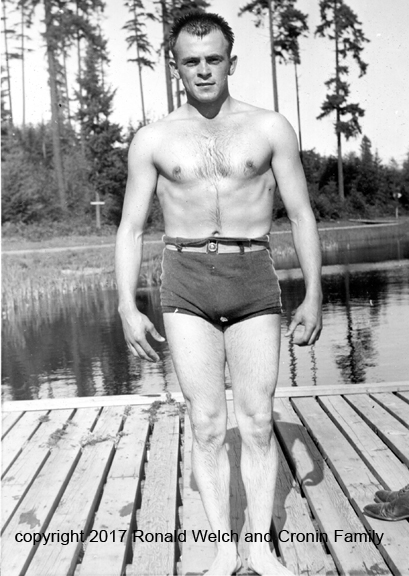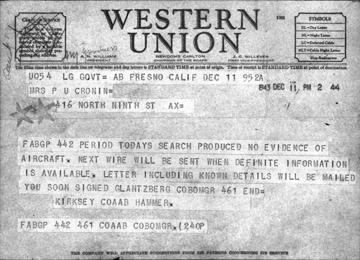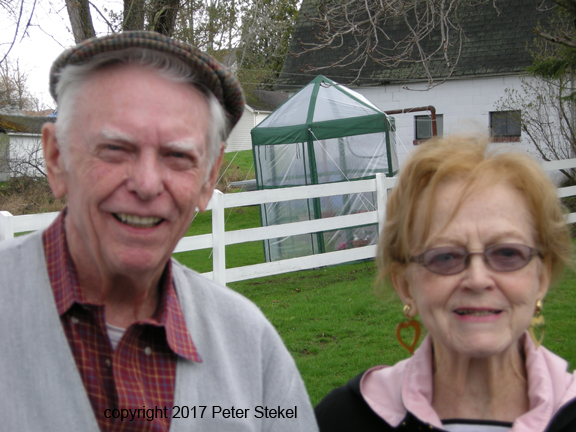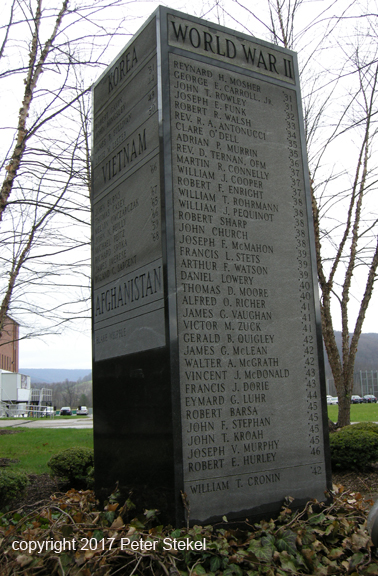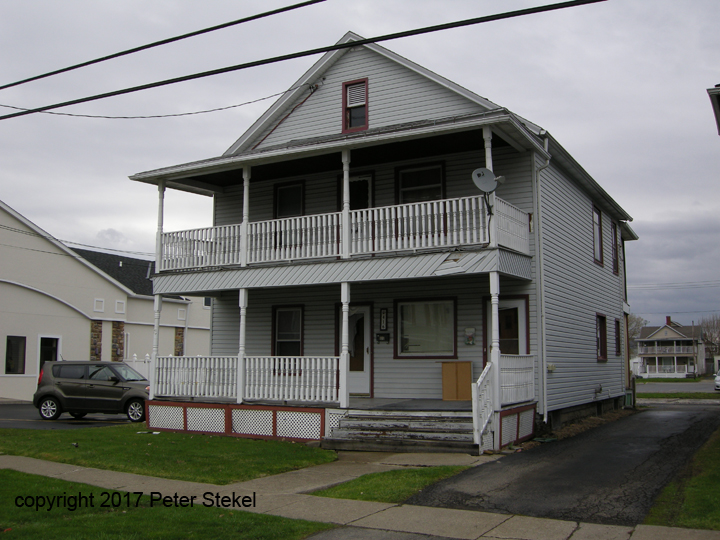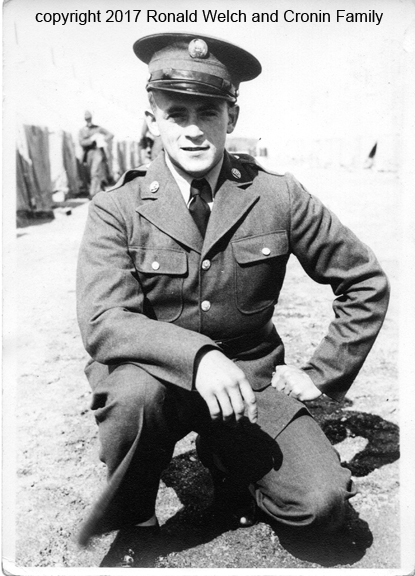|
|
|
2nd Lt. William T. Cronin
|
|
William T. Cronin, a resident of Olean in upstate New York, was the second child of Patrick J. Cronin (1893-?), a native of the Irish Free State, and his wife, Katherine (1894-?). Both were immigrants and both were naturalized citizens of the United States of America. Their first child was Harold (1918-August 8 or 9, 2007) who would eventually become a Lt. Colonel in the United States Air Force. Harold enlisted as an aviation cadet at Fort Lawton, in the San Francisco Bay Area, on August 15, 1941. Bill Croninís three younger sisters were Lillian (1923-October 3, 2014), Mildred (1928- ), and Eileen (1929- ). Eileenís son, Ron Welch is an important part of this story because it was he who found me. The Inyo Register in Bishop, California, ran article about my research for this book in their September 1, 2011 issue. Ron contacted me via email. "Somehow, I became the maintainer of the family history on Bill, and I have a great deal of information on the incident including magazine and newspaper articles, photographs, etc. going back to the first report of his being listed as missing. By a wild coincidence, my mother recently asked me to clean out the remaining family records on the crash the next time I am visiting her." As I discovered with the Hester, Fish, Bursey, and Mayo families, the opportunity of speaking to two of Bill Croninís sisters greatly enhanced my knowledge of this boyís life. I even got to speak with the first girl Bill considered a sweetheart!
(Bill with some of his buddies during training) William Thomas Cronin was born October 15, 1919 and enlisted in the United States Army Air Corps on July 3, 1941. He attended St. Bonaventureís College in nearby Allegany, New York. Because of his enlistment, Bill never graduated. Bonaventure is the same place where Ron Welch, Billís nephew, received his bachelorís degree. Welch had enrolled in an English class and, "the instructor was telling us about the memorial to the war dead the school had installed and that everybody from the college who died is on that." Ron knew that wasnít true because his uncle Billís name wasnít on the memorial. When the professor heard Bill Croninís name he exclaimed, "Oh! I remember seeing him! He used to walk the three miles from his house to the university. He was taking classes there before the war. I remember him well." Billís little sister, Eileen Cronin Welch remembers Bill not walking to class but running! Both ways! Those miles of open fields and farms Bill ran through are now paved streets with residences, corner malls, hotels, and other commercial properties. The Cronin family owned a house at 416 North Ninth Street, a two-story affair covered with deep front porches on both levels that ran the width of the building. Eileen says, to this day, when she thinks of her brother, "I can see him in the kitchen. Oh! And I can see him and his brother walking up the street." Mr. Cronin insisted the children go to church every Sunday. Bill and Harold would be out to all hours on Saturday night, coming home when the roosters crowed. Mr. Cronin would hear them come in the house and would say, "OK! Time to go to mass." All these years later, Eileen is still amused. "They didnít want to go to church!" Father would say, "You were up all night and youíre going to go to church. So theyíd go to twelve oíclock mass and sit up in the choir and, Iím not sure, but probably to sleep. "But they went!" She laughs some more. "Oh my!" Bill Cronin was a popular guy with the girls in town. "He could do so much. Good at sports. Handsome. Smart. Personable. Well-liked." Charlotte Yahn Murphy knew Bill back in Olean. She was two years his junior but Eileen Cronin Welch remembers that Bill was sweet on Charlotte and Charlotte was the "pick of the crop" of women who were interested in Bill. A "lovely, loving girl." In turn, Charlotte Murphy remembers, "We were good friends. What can I say? I know that I liked him and he liked me! He was a very nice young man." Like everyone else in Olean, Charlotte was shocked and devastated by Billís death.
Bill and his older brother, Harold, were close as two peas in a pod. They did everything together. To the south of Olean is a turtleback-shaped peak known as Mt. Herman. The boys built a cabin up there during high school and it became their retreat and stayed that way when the boys entered college. Bill spent time up there on his last visit home in 1943. Eileen Welch was fourteen years old when her brotherís airplane went missing. Not until recently has she been able to talk about those dark days and confront the past. Memories can be sweet and they can be terrible and given the situation either kind of memory can be painful to remember. Then something happens. For Eileen it was the physical process of taking all the family memorabilia about Bill - letters, photos, and papers - and mailing them off to her son, Ron. She kept them all in a box "where I stored all my memories of that time many years ago." For the longest time, "I just couldnít open that folder."
Eileen took her parcel of memories down to the post office. "And the girl behind the counter asked, ĎAre they valuable?í" With that, Eileen burst into tears. "I broke down and cried and she didnít know what she had said. I mean, the poor girl. I told her I canít talk about it, do what you have to do. And that was it." A month later she returned to the post office to apologize. "I told her you opened a whole can of worms, opened up memories I had pushed in the back of my mind for many years and didnít want to face." After that one little liberating moment Eileen is no longer haunted by the past but can let it roam freely. I visited Eileen and her husband Ron Welch in Eldred, Pennsylvania, right over the border from her home town of Olean. It was a pleasant visit and after lunch we piled into the car and these two wonderful people gave me a guided tour of Bill Croninís Olean, New York. We start at the Veteranís Wall of Honor, where there are far too many names for a town the size of Olean. Billís name is there along with over one hundred others, just from World War II.
(Ron and Eileen Welch) Next we visited Oleanís Veteranís Memorial Bridge, also with Billís name and the names of many others. It was a short hop from the Memorial to St. Bonaventure and the war memorial there. Thirty-five names are given on the courtyard granite monument from World War II. The names are arranged by year of graduation, running between 1931 and 1946. At the bottom, added at a later time once the mistake was made known, is the name of William T. Cronin, class of Ď42.
Our drive took us to the family home on North Ninth, looking old and ragged and in need of paint. But itís the same house and the same street that Bill played on. We got out of the car and Eileen pointed in the direction that Bill would come running home every day after school, his book bag banging against his back. "There were other families on the street with lots of kids and always someone to play with." During our tour, in early May, the day was grey and dreary and the street deserted. Eileen said it looked so different. "Am I in the right place?" Yes; right place, different time.
(a contemporary view of the Cronin Family home in Olean, NY) It broke Eileen Croninís heart when her brother disappeared. It broke her heart again the following year when the army shipped all Billís belongings back home in a duffle. "We didnít have any place to store it so, a lot of it, like his uniforms and stuff..." She lowered her voice to a whisper and with such sadness in her voice said, "We just threw it all away." Perhaps Eileenís most vivid memory from that time involves her mother and how proud Mrs. Cronin was in getting a job - her first - at the Union Cutlery plant, making knives for the Army. The factory was "just at the end of our street." She had only been working "around two weeks" when the news about Bill came. Eileen can still see her walking down the street to work, wearing her "little bib overalls," and the "chunky black shoes" women wore in those days. And when the Western Union cable was delivered to the house with news of Bill, her father took that news to Union Cutlery. In telling me the story, this is the first time Eileenís voice cracks with emotion. "Oh dear. It was simply awful. That Christmas, of course, we didnít have a tree." By now she is crying so much I canít understand what she says until her voice clears and she strongly says, "Itís wonderful to think that somebody cares enough to write about Bill and his crew."
|
| | Home | The Crews | B-24 Liberator | Media | Links | Images| |
| | The Author | Books by Peter Stekel | Press Packet | Contact | |
|
|Extended end notes from Beneath Haunted Waters|
|
|
copyright 2017 by Peter Stekel - all rights reserved |

